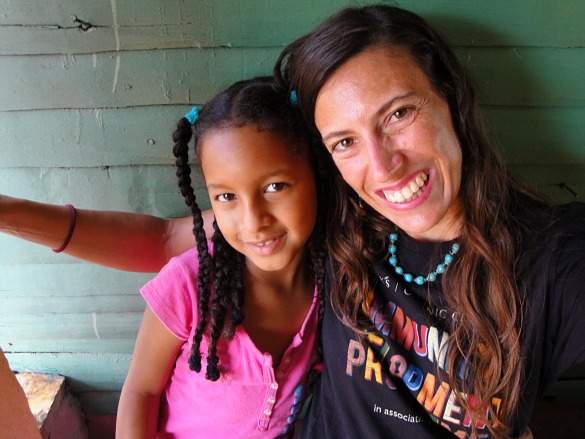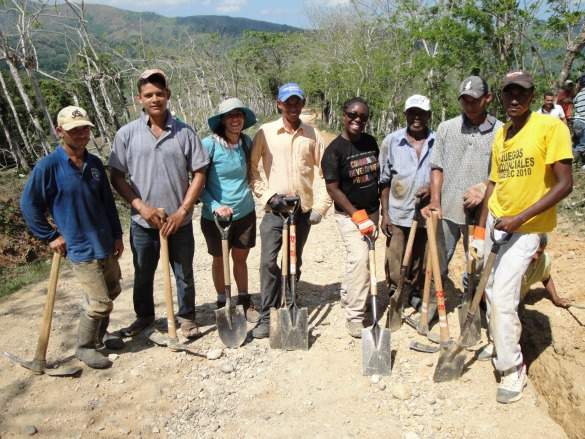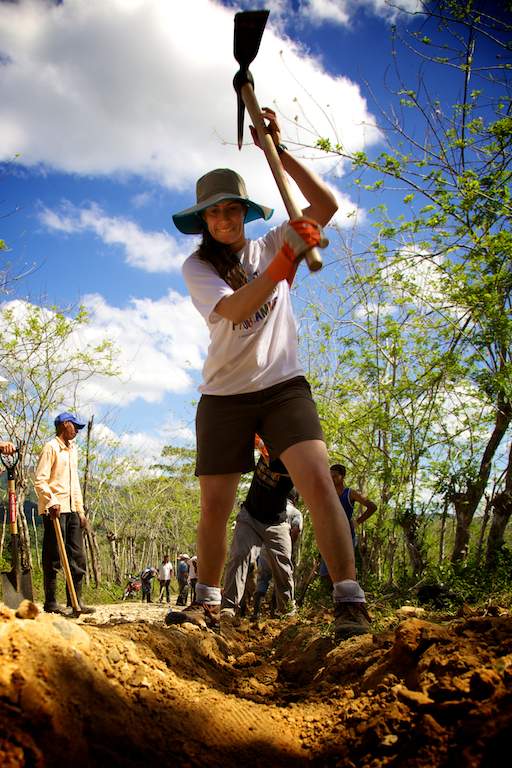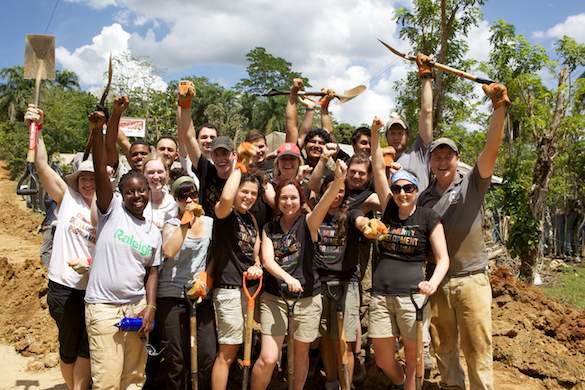In the world of international travel, voluntourism is the new buzzword. Satisfying both the yearning to explore foreign landscapes and cultures, and the attraction to forming meaningful relationships with locals, becoming more fluent in a new language, and contributing something of value to the local community, voluntourism is redefining how travelers choose to spend their vacations.
I recently returned from an expedition to the Dominican Republic sponsored by Green & Black’s – an organic chocolate company. As one of ten Ambassadors, I spent two weeks building a gravity-fed drinking water system with an organic cocoa growing farming community in the fertile hills of the Dominican Republic’s Duarte Province. Living with local families for the duration of my stay gave me the opportunity to experience, on a very personal level, the challenges posed by not having access to fresh, running water for drinking, cooking and bathing. Learning to bathe using a bucket of cold water; using a composting toilet; adapting to the local diet of green plantain, rice and beans, and becoming accustomed to the irregularity of electricity required a good deal of flexibility. But living with a local family gave me the opportunity to improve my Spanish, enjoy local music and dancing, learn more about how cocoa is grown, harvested and processed, and to more fully appreciate what it is like to be an integral part of a tightly knit community.
When I visit a new place, I always leave feeling as though I have benefited from the experience, but rarely do I feel that I have, in turn, contributed something of value to the local community. Although digging trenches in hot, humid weather was very physically demanding, and I ended most days exhausted, I felt the satisfaction of knowing that I was working together with the community to improve the long-term quality of life for the local population was invaluable, and living within community gave me a much richer experience of the Dominican culture, people and way of life than would have been available to me had I approached my visit as a mainstream tourist.
If you are interested in exploring a new type of travel experience, and wondering whether voluntourism is right for you, here are a few things to consider:
Balancing integration with independence
Volunteering provides an opportunity to experience the reality of daily life in the community you are visiting. You get to know the place intimately, through the eyes of the people you live and work with. You are exposed to cultural, religious and social traditions; gain insight into the relationship between your hosts and their natural environment; hear insiders’ perspectives on local history and politics; eat traditionally prepared meals with your host family; hear local music, and possibly get the opportunity to learn local dances.
Living with locals also means you will improve your fluency in a foreign language, your non-verbal communication skills, and your ability to laugh at yourself (try keeping a straight face while attempting to explain to your host mom that the individual responsible for the smashed china vase on the floor was, in fact, a toad that somehow managed to get into the house, without actually knowing the word for toad!) Interacting with the people and place at such an intimate level can also lead to the development of life-long friendships, and a personal connection and investment in the country that may lead you to return again, in the future.
While living and volunteering in a community is an extremely rich experience, it also means you have less independence, and have to be more flexible than you might have to be if you were just traveling through. On my recent trip to the Dominican Republic, I started every day with a plate of fresh, juicy pineapple and sweet bananas picked from the trees outside, along with a cup of steaming cocoa made from freshly ground cocoa beans harvested from the trees behind my host parents’ house. But the meal was a little earlier than I might have liked to be up, and I had to bathe in the dark, using cold water out of a bucket in order to be at the breakfast table on time.
The neighborhood that I lived in had lots of little girls living in it who tended to congregate on my front porch as soon as I got home from work in the evenings. This meant lots of quality time with the local children, lots of laughter, games and dancing, but it also meant that I had very little personal time in the evening. And while I loved the fresh fruit, I was not the biggest fan of the boiled green plantain, which was served in generous portions every day with supper. In some voluntourism arrangements, you simply don’t have the freedom and flexibility you would traveling independently.
Giving back
One definite benefit of volunteering is knowing that you have contributed something that is of practical value to the local community. Collaborative projects between local and international organizations often facilitate the sharing of new technology and information that has the potential to significantly improve the quality of life. International cooperation also nurtures intercultural dialogue and understanding between countries.
Spending hours digging trenches and laying water pipe with Dominican cocoa farmers gave me the opportunity to learn more about them, in a culture where I would probably otherwise not have had the chance to speak with men so openly, and to ask them how they thought having access to potable water would change their lives. Although CONACADO, the cooperative that they sell to, supplies much of the organic cocoa used to make Green & Black’s chocolate, none of the farmers I spoke with had ever actually tasted the final product. Sharing a Green & Black’s chocolate bar with them, and seeing their excitement at knowing their cocoa was used to make it was another way in which I felt my presence was strengthening the cross-cultural connections and building a larger sense of community.
Manual labour in the Dominican Republic is traditionally done by men, which meant that the women in our group spent the first few days trying to wrestle shovels away from the men, who responded by alternately taking tools away from us, insisting that we sit down and rest, and peering down into the trench at us with incredulous curiosity. By the second week, groups of local women came out to join us in the trenches; and by the end of our project local men and women were working alongside each other, and there was a general sense of community pride and empowerment.
While every volunteer experience is different, depending on the type of project you do, where you do it, and how you respond to the opportunities and situations that arise, you will inevitably learn new skills, generate new ideas and develop new perspectives, and strengthen your intercultural communication skills. The local community will undoubtedly teach you far more than you contribute, but it is nevertheless deeply meaningful to know that you have made even a small contribution to the people and place that have taught you so much.
Practical considerations
If the idea of volunteering has you so excited that you are already packing your bag, here are a few practical questions to help you decide where to go, and how to find the right volunteer opportunity:
1. Do you have any specialized skills?
You will be most valuable to your host community if you match any specialized skill set you have with the local needs of the community. Especially if you plan on volunteering as an individual, for a short period of time, having a pre-existing set of skills will ensure that you make a meaningful contribution during your stay.
2. How much time do you have?
If you only have a short period of time, going with a group may well be the best idea. Unless you have some highly specialized skills that you can put to use, joining a larger group of people will maximize how much you are able to accomplish. A longer trip allows more time for you to acquire any new skills that might be needed for the work you will be doing. If you have a short period of time, working with a volunteer organization that provides a lot of structure and support may guarantee that you accomplish your goal. If you have longer, a more self-directed approach might suit you better.
3. Where do you want to go, and what kind of work do you want to do?
It may seem obvious, but if the idea of trying to think, or do hard manual labor in a hot tropical climate sounds like a nightmare, I would recommend you avoid the Tropics. Likewise, if you are interested in environmental work you may want to choose a country where environmental issues are a priority for the local community. Haiti would be a great choice for someone with medical or infrastructure expertise, but until people have roofs over their heads and food in their stomachs, they are unlikely to see the value in protecting local wildlife. Some volunteer organizations have long-term partnerships with local NGOs and government agencies to ensure that their volunteers are taking part in projects that are a priority to the host country. Matching your needs and interests with a volunteer organization’s strengths and on the ground connections will help to make sure that your volunteer experience is successful and satisfying.
Finding the right volunteer project
If you are extremely self-directed and flexible, and feel confident about making your own connections, you can choose the country you want to go to, and then contact the organization with whom you would like to work directly. The drawback to this approach is that it requires a lot of extra work on your part, and there is always the chance that you could arrive to find that the details do not fall into place as well as you might have liked.
For those wanting more structure, there are hundreds of volunteer organizations out there, specializing in every kind of volunteer activity imaginable. Every volunteer organization has its particular strengths. Some specialize in placing individuals. Others are experts in facilitating group expeditions. Some organizations are highly structured, providing a lot of training and on the ground support, while others may get you to your volunteer site and then leave you to your own devices. The International Volunteer Programs Association (IVPA) (volunteerinternational.org) is a great online resource that includes tips on how to choose the right volunteer organization for you. Another excellent resource is volunteeroverseas.org. Two publications on volunteer organizations around the world are How To Live Your Dream Of Volunteering Overseas and Volunteer Vacations: Short-Term Adventures That Will Benefit You and Others.
Although it is a bit of a hit or miss way to look for volunteer opportunities, socially-oriented companies regularly run promotional competitions that are advertised on social media sites like Facebook. The trip I went on with Green & Black’s is an example of this, and required very little work on my part, because they located the volunteer organization that led our expedition. My trip to the Dominican Republic was led by Raleigh International, which has permanent offices in most of its destination countries.
Part of the fun of volunteering is researching the possibilities and finding a project that is interesting and exciting to you, and best matches your skills with a local need. Good luck with your search, and enjoy serving as an agent of change!
For more on voluntourism, read:
- How to Get Started with Voluntourism
- 9 Volunteer Vacation Ideas
- Volunteering Travel Guide
- The Art of Traveling in Developing Countries
All photos by the author and may not be used without permission



